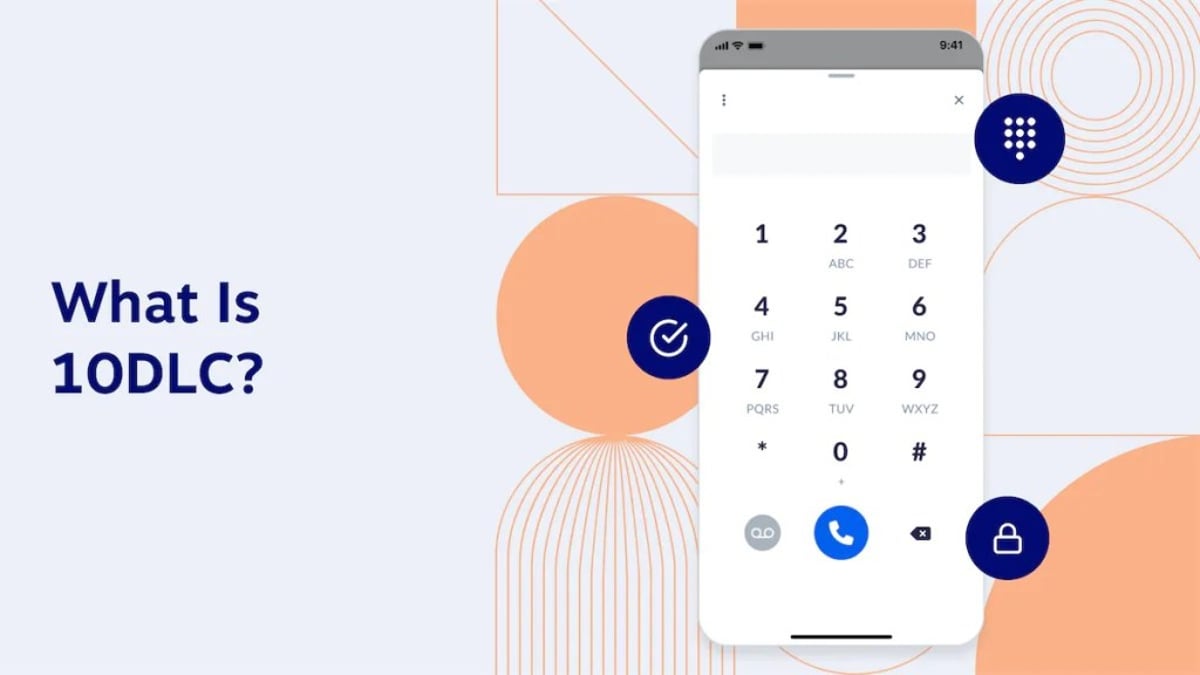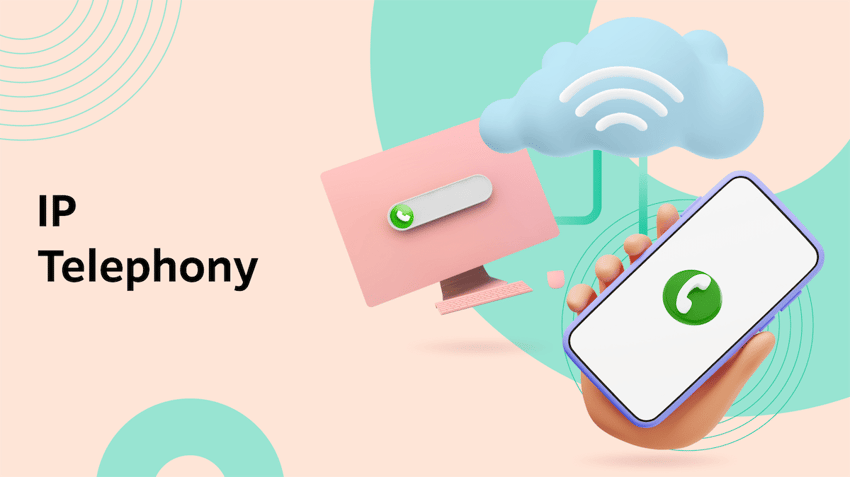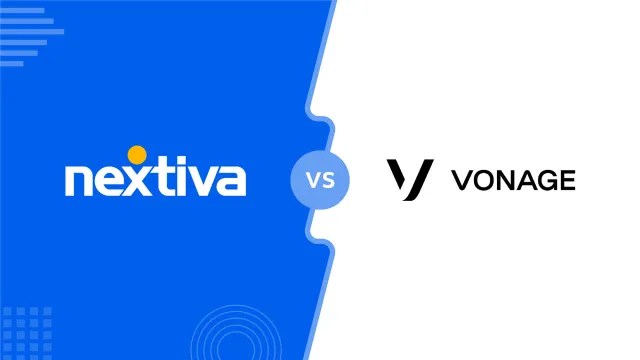Need some help decoding A2P 10DLC for your business communication needs?
A2P 10DLC, short for Application-to-Person 10-digit long code, is a messaging standard that allows businesses to send SMS messages to customers using standard phone numbers.
To help you use business text messaging effectively, we’ll talk about A2P 10DLC, its benefits, how to register for a 10DLC number, and how to comply with key messaging regulations.
You’ll forge stronger connections with your audience, avoid expensive fines, and set up your team for next-level success.
What Is A2P?
A2P stands for Application-to-Person messaging. It refers to any communication where a software application sends a message to a mobile phone user. These messages are typically one-way, meaning the recipient is not expected to reply.
A2P messaging allows businesses to send customers automated text messages. Businesses use A2P messaging for various purposes, such as account notifications, delivery alerts, promotional offers, two-factor authentication security codes, and more.
What Is 10DLC?
10DLC stands for 10-digit long code. It’s a specific type of phone number used by businesses in North America for A2P messaging.
Businesses can use 10DLCs to send a high volume of messages, including promotional messages, special offers, and updates to their customers.
The genius of 10DLCs is that they’re designed to look like local phone numbers. This makes business communication, text message marketing, and bulk messaging appear more trustworthy. Plus, 10DLCs allow for two-way messaging and voice calls.

What Is A2P 10DLC?
A2P 10DLC is a messaging standard that enables businesses to send Application-to-Person (A2P) SMS messages using a standard 10-digit long code (10DLC) phone number.
It’s a system in the United States businesses use to send authenticated and secure SMS/MMS messages to mobile users. A2P 10DLC was developed by mobile carriers to improve messaging reliability and security, and to combat spam and fraudulent activity.
Put simply, A2P 10DLC means text messages are authenticated by the provider and routed through a software interface (like a web, desktop, or mobile app). The standard ensures that the messages come from a legitimate source and helps prevent spam and fraudulent activity.
Combining the power of A2P messaging with the versatility of a 10DLC gives you a robust, scalable solution for SMS business communication.
To implement A2P messaging, businesses have several options for sending their messages: short codes, toll-free numbers, and 10DLC numbers.
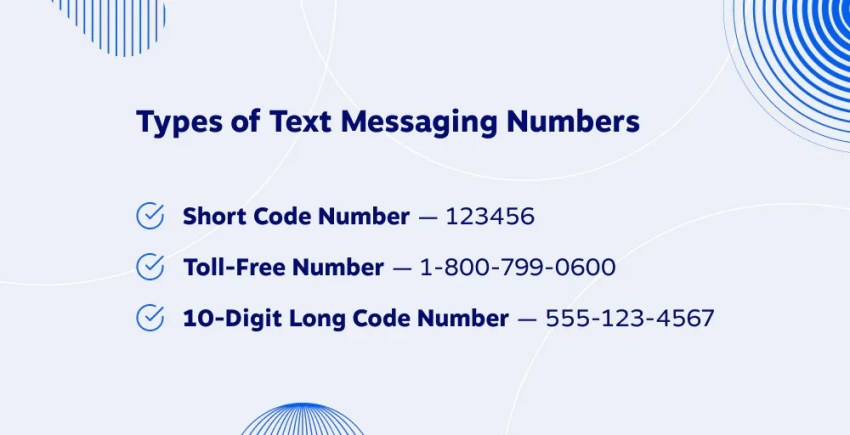
Toll-free numbers vs. 10DLC
Both 10DLC and toll-free numbers can be used for A2P messaging. But that simple area code makes 10DLC a better choice for large and small businesses. This local phone number feels more personable and gets more engagement.
Just think about the last time you answered a random 1-800 number. You probably sent it straight to voicemail, right?
Further, 10DLCs are more cost-effective than toll-free numbers, costing anywhere from $15 to $30 monthly. 10DLC texts? US carriers charge a fraction of a penny for these based on message volume.
Short code numbers vs. 10DLC
Short codes are more difficult to obtain and more expensive (about $1,000+ per month) than 10DLCs. They also have a higher chance of getting filtered out as spam or blocked.
You can only use short codes for large marketing campaigns. 10DLCs offer more flexibility and versatility in their use and campaign types because they support two-way messaging and voice calls.
| Messaging Number Type | Pros | Cons |
|---|---|---|
| Short code | Easy to remember | May be more expensive |
| Toll-free | Free for customers to call or text | May not be as memorable as a short code |
| 10DLC | Can be used to send marketing and transactional messages | Requires registration with a Somos aggregator |
Overall, A2P 10DLC is a valuable tool for businesses in the US that need to send A2P messages in a reliable, compliant, and cost-effective way.

The Importance of 10DLC Compliance
A2P 10DLC creates a fully automated text messaging ecosystem that integrates with existing business systems, reducing manual effort and enhancing customer engagement.
Why was A2P 10DLC created?
A2P 10DLC sounds like a no-brainer for forward-thinking businesses. That’s why everyone jumped on the bandwagon — including those with nefarious intentions.
As consumers got bombarded with spam messages and text scams from unknown senders, they became wary of all SMS — even legitimate ones.
To protect consumers from phishing attacks and other security risks, Congress and the Federal Communications Commission (FCC) passed stronger regulations and made opt-outs non-negotiable.
The major North American mobile carriers (Verizon, AT&T, and T-Mobile) created The Campaign Registry (TCR), a third-party organization that vets and controls 10DLC registration.
TCR tracks which businesses are texting from these numbers and what types of messages they’re sending in a central database.
A2P 10DLC compliance standards
What are the A2P 10DLC requirements? Businesses must now gain approval from TCR before they can send messages. The A2P 10DLC registration process has two parts:
- Brand Registration: Businesses must identify themselves to the carrier networks.
- Campaign Registration: Businesses must give examples of the messages they’re sending and show proof that consumers opted in to receive their text messages.
The vetting process ensures that businesses are legitimate and comply with regulations set forth by the Telephone Consumer Protection Act (TCPA) and the Cellular Telecommunications Industry Association (CTIA).
Brands must familiarize themselves with the CTIA Messaging Principles and Best Practices to demonstrate their compliance and receive approval.
Who needs to register for A2P 10DLC?
Anyone sending SMS/MMS messages over a 10-digit long code number from an application to US phone numbers needs to register for A2P 10DLC. Carriers consider all SMS traffic from many messaging platforms to be A2P, requiring registration. This applies even if you’re not a business.
How carriers ensure compliance
When TCR verifies that a business is legitimate, it will assign a 10DLC number with a trust score.
Carriers use this trust score to prioritize message delivery. Higher trust scores mean higher delivery rates and message throughput (messages sent per second). Lower trust scores mean the opposite.
Consequences for non-compliance
All mobile carriers began blocking texts from unregistered 10DLC numbers on August 31, 2023 (the original deadline).
Carriers also impose hefty fines and non-compliance fees on businesses that fail to gain TCR approval. For example, T-Mobile has fines of up to $10,000 per non-compliance incident.

Business Benefits of A2P 10DLC
A2P 10DLC is a game-changer for businesses striving to level up their messaging strategies. Here are several benefits of texting with an A2P 10DLC number.
1. Improved deliverability
Unlike short codes that often get caught in spam filters, 10DLC messages have a much better chance of reaching your audience’s inbox.
It’s all thanks to the reputation scores assigned by TCR (The Campaign Registry). The higher your score, the more likely your messages will be prioritized by mobile carriers.
Plus, with improved throughput, you can send more messages per second, ensuring your time-sensitive notifications and promotions always arrive on time.
2. Compliance with regulations
A2P 10DLC is designed to keep businesses in line with the Telephone Consumer Protection Act (TCPA) and the Cellular Telecommunications Industry Association (CTIA) regulations.
The vetting process ensures that only authentic businesses using 10DLC numbers can send messages, proving that the content is consensual and comes from a genuine source. It’s a win-win for everyone involved.
Related: TCPA Compliance Checklist and Best Practices for Businesses
3. Increased engagement
Customers are more likely to trust and engage with messages that come from a local phone number. It’s like receiving a text from your favorite restaurant or doctor’s office — it feels familiar and authentic.
With improved deliverability and reliability, your customers will always be in the loop, fostering positive interactions and loyalty.
And let’s not forget about two-way messaging. It allows customers to initiate conversations and interact with your brand just like they would in person or through customer support — a fantastic opportunity to showcase your customer-first approach.
4. Cost-effectiveness and versatility
A2P 10DLC offers incredible versatility and flexibility for various use cases. Not only can you send clever SMS campaigns, but you can also add two-way messaging and voice calls to your customer engagement strategy.
It’s also cost-effective compared to short codes and toll-free numbers. A2P 10DLC is accessible and scalable for businesses of all sizes, allowing you to tailor campaigns to your specific needs and goals without breaking the bank.
How To Register for A2P 10DLC (In 5 Steps)
Businesses don’t interact with The Campaign Registry (TCR) on their own. Instead, the communications provider completes the registration process and secures a 10DLC number for them. Here’s how it works:
Step 1. Choose a campaign service provider (CSP)
A campaign service provider (CSP) works with multiple brands to create and launch SMS messaging campaigns. They’re the “A” in A2P, an application or software provider your business uses to text.
When comparing your options for business text messaging tools, look for a reputable provider with friendly support and business voice and messaging capabilities.
Your provider should have a special form for you to complete so they can handle the registration process on your behalf.
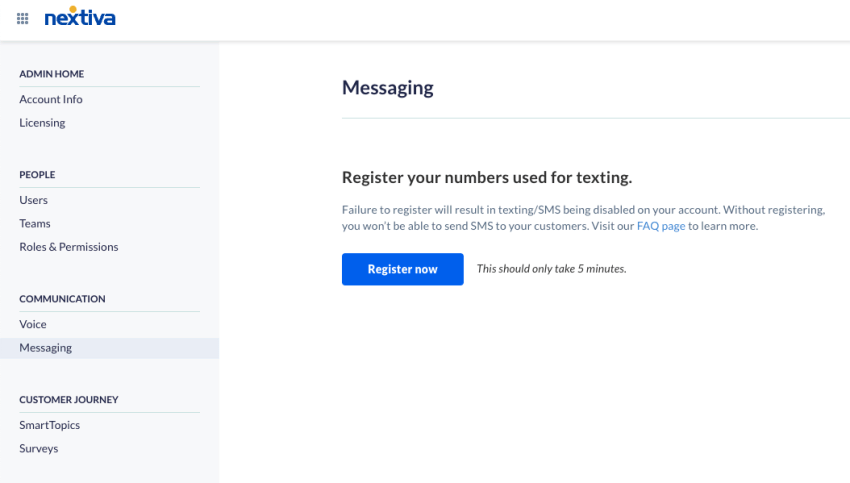
Step 2. Register your brand
Registering your business with the TCR identifies your brand to the carrier networks and verifies the legitimacy of your company.
Your service provider will submit details about your organization and may collect details such as the Tax ID, entity type (non-profit, public, private, government), business type (LLC, sole proprietor, or corporation), etc.
Step 3. Campaign and use case registrations
Carriers must also understand and specify the types of messages your business intends to send, along with the frequency and purpose of each messaging campaign.
Your proposed campaign details will include:
- Use case (standard campaigns or special use campaigns)
- Message content and attributes
- Three to five sample/example messages
- Opt-in information (proof of verification and consent from consumers)
When outlining your campaign use cases, consider how you plan to use SMS for business communication. This might include sending messages for:
- Customer support and follow-up
- Marketing offers like discounts and coupons
- Reminder texts (appointments, upcoming due dates, etc.)
- Surveys, polls, and feedback about recent experiences
Step 4. Verification and vetting by TCR and mobile carriers
TCR will review your application to ensure you comply. They may also request additional information or clarification if necessary.
Once approved, your brand will be registered, and your campaign use case will be reviewed and scored. Then, you’ll get your 10DLC number and link it to your campaign.
You can link multiple 10DLCs with a single campaign. However, you cannot use the same 10DLC for multiple campaigns. You’ll need a unique 10DLC for each campaign you create.
Step 5. Testing and launch
After a campaign is approved, your service provider works with mobile networks to update their databases with your confirmed 10DLC number.
It’ll be added to a shared industry database and go live for testing. Don’t skip this step. Ensure your numbers operate seamlessly and comply with carrier requirements.
Fix any issues during testing to guarantee a smooth customer experience.
Top-Rated A2P 10DLC Service Providers
In the vast sea of SMS service providers, comparing all your options can feel overwhelming.
Larger providers are often too complicated for the needs of small businesses. Yet smaller providers lack the features, functions, and bulk text pricing that better align with your goals.
Let’s see how these five service providers compare:
1. Nextiva
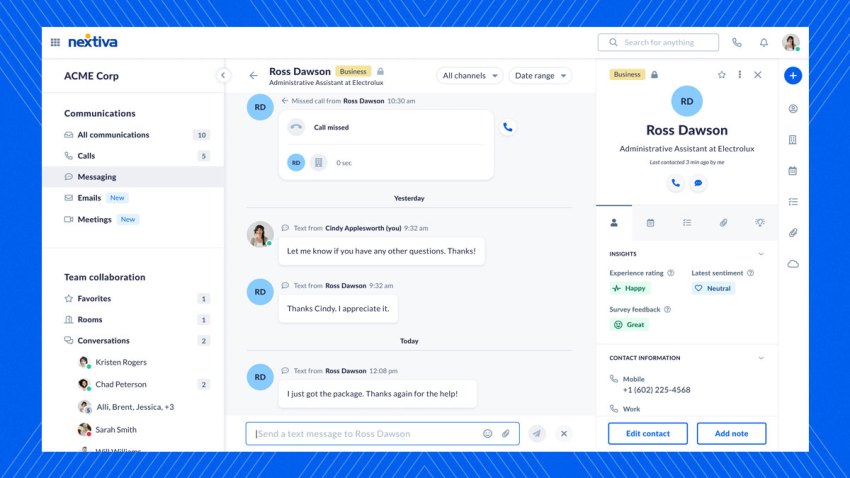
Nextiva is one of the best-rated business phone systems. Our VoIP technology empowers your brand to call and text anyone in one simple, streamlined business phone service — no need to add a separate text messaging provider to your budget.
Business phone numbers from Nextiva comply with the new A2P 10DLC standards, and our business text messaging plans include thousands of text messages per user (where our competitors charge extra). And our relationships with phone service providers mean your text messages are always reliably delivered.
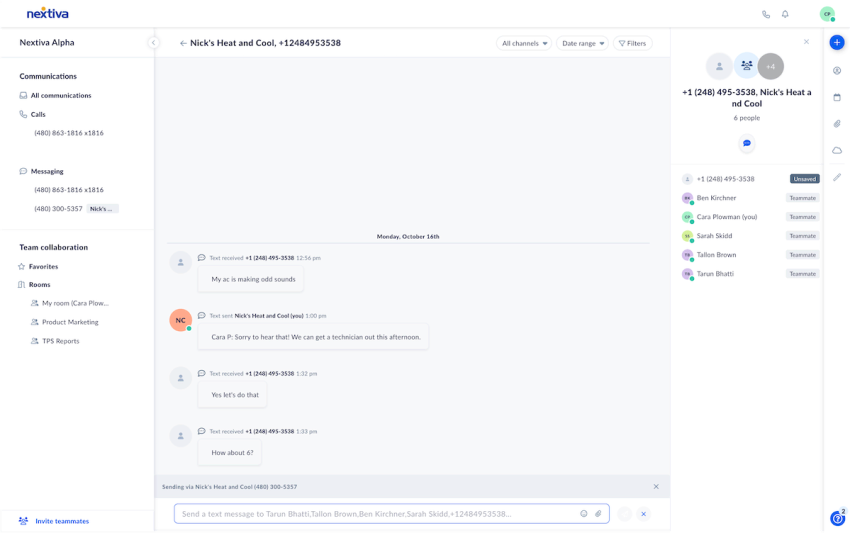
Your brand scores all the benefits of VoIP messaging without any of the clunky API integrations. Select or port in as many local phone numbers as your business needs. We’ll verify they’re available and enable VoIP SMS on them for you.
Nextiva’s full-featured VoIP plans range from $15 to $25 per user per month. But the best part? Business VoIP with texting is just the start — every Nextiva plan includes the most advanced communication features brands need to thrive.
2. Twilio
Twilio provides programmable communication tools for your business to send and receive text messages with its web service APIs. While they are a great carrier, you’ll need a full-stack developer to take advantage of its offerings.
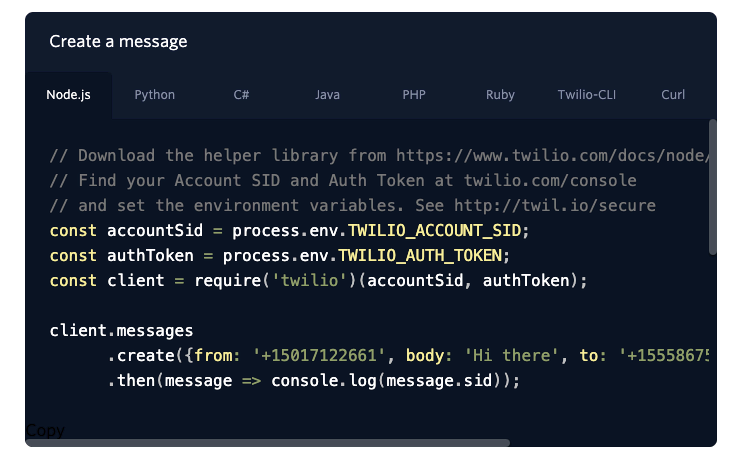
Their SMS pricing is based on the destination, type of message you’re sending, and carrier to which the SMS is being sent. Here’s a quick pricing breakdown:
- Outbound and inbound SMS from 10DLC numbers: $0.0079 each
- Automatic carrier fees: $0.0030 to $0.0050 per message
- Leased 10DLC numbers: $1.15 per month
- Bring your own 10DLC number: $0.50 per month
Read Next: The Best Business Texting Replacement for Twilio
3. Vonage
Vonage provides cloud-based unified communications and programmable communications APIs for businesses and enterprises. Its virtual phone numbers and SMS API require coding experience to deploy, which many small teams may find to be a blocker.
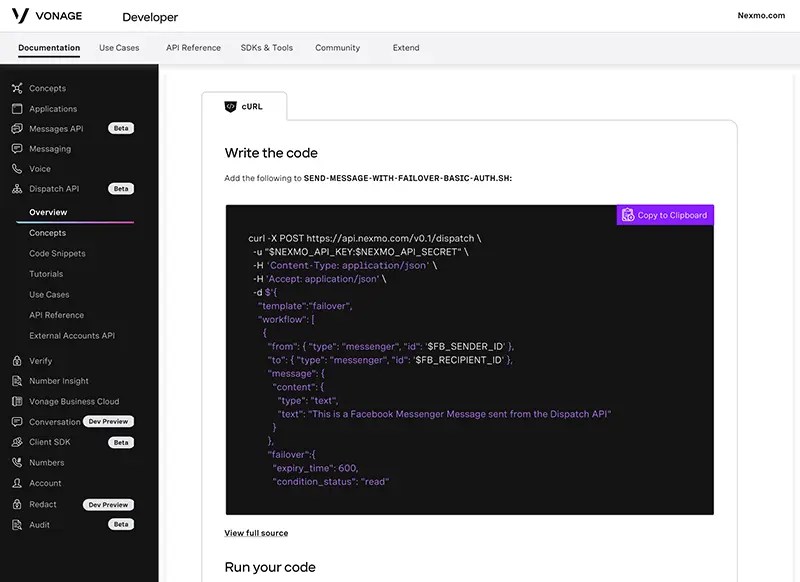
Here’s a rundown of their SMS pricing:
- Send a message: $0.0066 per message
- Receive a message: $0.0061 per message
- Rent a virtual phone number: $0.96 per month
- Additional 10DLC carrier fees range from $0.0025 to $0.005 per message
4. ClickSend
ClickSend builds communication software and tools for businesses. Their SMS tool can be accessed via their Dashboard, app, API, or integration.
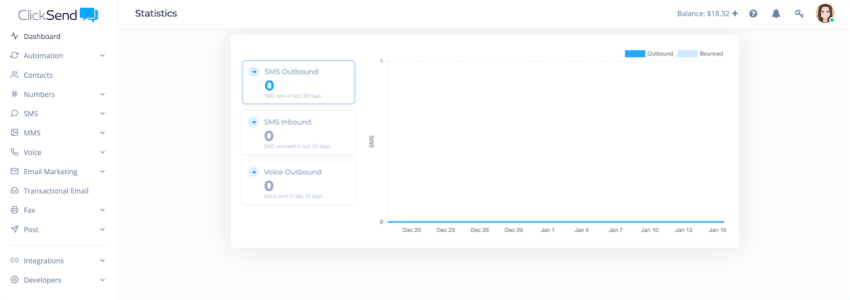
Here’s a snapshot of their SMS pricing sheet:
- Outbound SMS prices scale from $0.0228 per message (for under 5,000 messages/month) to $0.0082 per message (for 150k messages or more)
- Additional SMS carrier fees are charged at a flat average rate of $0.0025 per message
- Inbound messages are free, but replies are supported via a dedicated number, which costs $1.58 per month
5. TextMagic
TextMagic provides pay-as-you-go software to send personalized SMS texts from your online account, email, proprietary app, desktop, and more. There are no setup or account fees; you’ll only pay for the services you use.
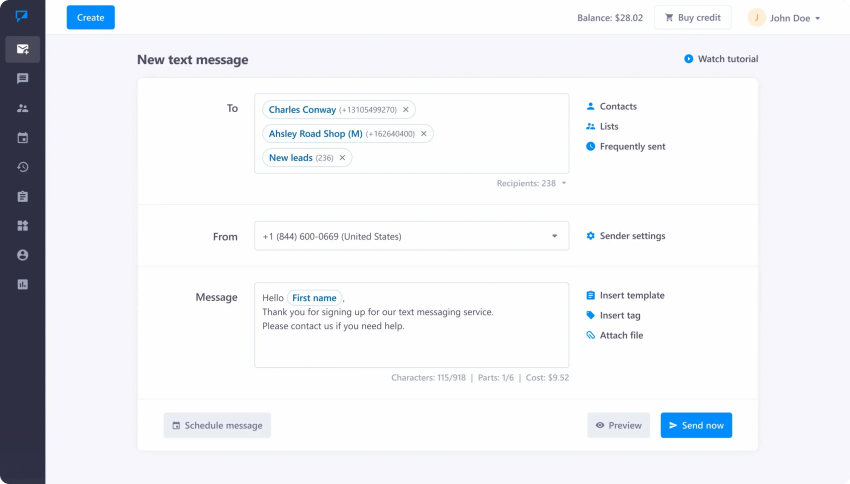
Here’s an overview of their SMS pricing:
- Virtual phone number: $10 per month
- Price per SMS in the US: $0.049
- Messages longer than 160 characters incur additional charges
- No group messaging; sending one message to 10 recipients is the equivalent of sending 10 individual messages
Take Advantage of A2P 10DLC With Nextiva
As brands navigate the complexities of A2P 10DLC, enhanced reliability, trust, cost savings, and increased engagement make it a worthwhile investment.
Nextiva gives teams a comprehensive set of team collaboration and customer support tools. Text messaging is core to that — available with its business communication plans — without API coding. It’s built-in.
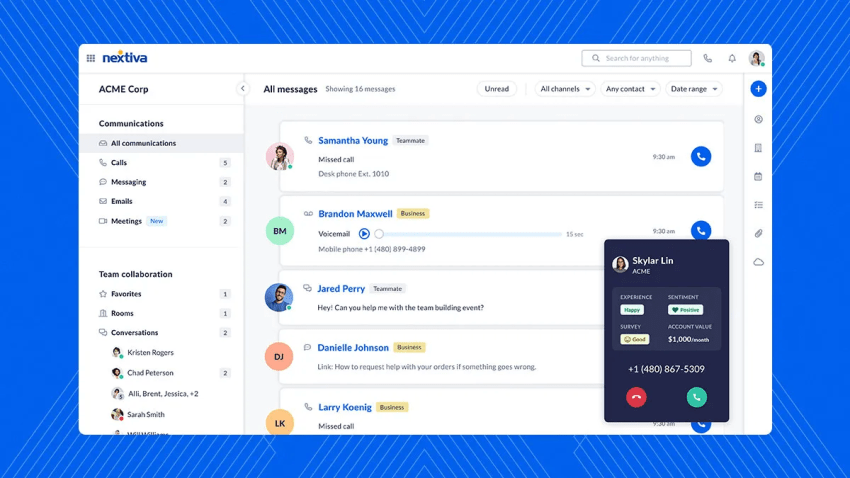
Choosing a reliable VoIP service provider is the first step to unlocking the full potential of this next-level messaging solution.
We’ll guide you through the entire registration process so your brand can harness the power of A2P 10DLC … ASAP.
Learn more about Nextiva’s A2P 10DLC services here.
FAQs about A2P 10DLC
– Registration required: Businesses need to register their A2P 10DLC numbers with mobile carriers before sending messages. Any 10DLC numbers not properly registered with TCR will be blocked by carriers, preventing message delivery. Sending messages via unregistered 10DLCs also risks fines and penalties imposed by carriers.
– Campaign restrictions: May have limitations on the types of messages that can be sent, compared to short codes.
– Not available everywhere: Currently only applies to the US.
It only takes a few minutes to complete your registration forms with your CSP. However, vetting and approval times vary based on your CSP, carrier review times, and demand.
Now that businesses must register with TCR, demand is high, and the approval process may take two to four weeks (or longer).
You’ll need to budget for setup fees from your chosen service provider, TCR, and mobile carrier fees. TCR charges providers a one-time registration fee and monthly recurring fees for campaigns, often passed to business users.
– Brand Registration: This one-time fee per brand ranges from $4 for Sole Proprietors and Low Volume Standard Brands to $44 for Standard Brands (which includes secondary vetting).
– Campaign Use Case Registration: One-time $15 fee per campaign vetting.
– Campaign Registration: Between $2 to $10 monthly recurring charge, depending on the type.
Our messaging guidelines are built from the CTIA Messaging Principles and Best Practices. Please refer to the CTIA guidelines for more details. Following these standards ensures optimal text message delivery is 10DLC certification.
Nextiva customers should take proactive steps to monitor and prevent unwanted message content, including but not limited to content that:
– Is unlawful, harmful, abusive, malicious, misleading, harassing, violent, obscene/illicit, or defamatory
– Is deceptive (e.g., phishing messages intended to access private or confidential information), including deceptive links
– Invades privacy
– Promotes illegal activity
– Causes safety concerns
– Incites harm, discrimination, hate or violence
– Includes malware
– Threatens recipients or intends to intimidate.
When an organization registers its local phone numbers for legitimate text message campaigns with its communications provider and The Campaign Registry (TCR), it is considered to be in compliance with 10DLC.


















 VoIP
VoIP 